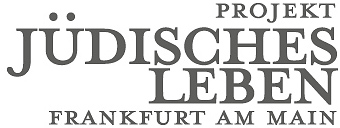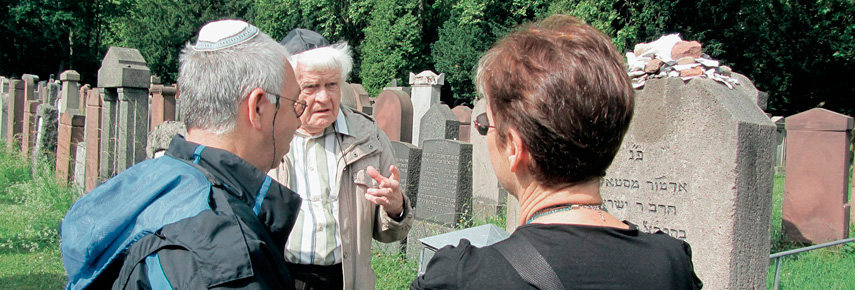Carol and Susan enjoyed a walk in the Palmengarten and in the West End, tracing the life of their father, despite the fact there was heavy rain. Their walk ended at the Dechema building, the Society for Chemical Technology and Biotechnology, where they took photographs as their father had requested. The building became the office of the Dechema after the WW II. Prior to the war it was housing Varrentrappschule, Eric’s first school.
Here is Carol’s impression of the visit,” “I am proud to say that I am a descendant of a German Jew from Frankfurt.” “I feel it is my duty to retell the story of my father’s life and examining the Holocaust. By telling the story I hope we can teach tolerance and acceptance of all people. This trip gave me the opportunity to learn about my roots and myself.”
Meanwhile, Eric,Carol and Susan have inquired about dual American and German Citizenship.
Reflections on our Visit to Frankfurt
From Carol and Susan Loeb
“I really appreciated the opportunity to join you in Frankfurt. I am extremely grateful that I was able to participate in at least part of the trip, and consider it one of the highlights of my life.
As I explain your organization to my friends and family, I describe you as taking the role of our ‘Frankfurt guides.’ You provided us with such a detailed history and knowledge, a history that was far more extensive than what my parents could provide. In such a short time I learned so much about myself and my German Roots. I enjoyed meeting the other participants. I found it very interesting that my upbringing was very similar to the rest of the group. Our parents sang to us the same German songs, read us the same stories and we ate the same foods. It became very clear that my upbringing was very German although I was raised in New Jersey. I felt a very strong connection to the other participants.
I will never forget the warmth and kindness I received from this group when I arrived after being in the hospital. It was as if I had known them my whole life. I felt a strong connection to the other participants. I found it very interesting that I was raised so similarly to the people in the group. I am proud to say, ‘My father was from Frankfurt.’ The trip made it clear how German my upbringing was. By the end of the trip the group became like a family.
Wherever I go, I tell my father’s story. I know that it is my responsibility to tell my father’s story and make sure that the people of the Holocaust are never forgotten. One day I hope to have the experience of telling my father’s story to a bunch of German children. Coincidently, the local school will participate in Facing History program. Maybe I will have the opportunity to talk to the children in my town.
I would love to continue working with you, to help educate about this horrible time in history.
Thank you for all your hard work and your dedication. Thank you for giving me the opportunity to be part of the program!
Carol Loeb”
“This trip demonstrated to me that in Frankfurt there is a major emphasis on acceptance and tolerance. While we cannot forget history, it is important to move on in a way that allows for all people to live together in harmony.
One of the most meaningful parts of the trip was speaking to the children in the Ernst-Reuter-Schule. After sharing my family`s experience, some of the students shared theirs. One girl from Turkey spoke about her own family’s religious persecution for the first time. It was a very emotional encounter. I have kept in touch with this student and plan to continue to stay in contact with her.
We also enjoyed exploring our father’s former neighborhood in the Westend and seeing some of the places where he spent his time. We took pictures in the Palmengarten similar to the picture we have of my father as a child in the same place. We really enjoyed meeting the children of my father’s childhood friend, Arnulf (Moppel) Borsche. Through this program four years ago, my father was reunited with his friend after 72 years.
We really appreciate having had this wonderful opportunity. We feel that we are able to be ambassadors for the city of Frankfurt and Germany – so that more people want to visit.
Susan Loeb”
Ambassadors for Frankfurt
Angelika Rieber
Carol and Susan both have many memories about their visit to the city where their father was born. These were fresh as they contacted the project group ‘Jewish Life in Frankfurt’ to tell them what the visit meant to them.

